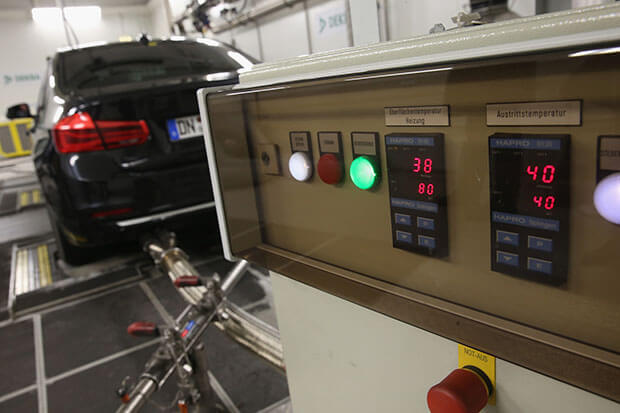European Union Proposing Strict Electric Vehicle Targets

The EU parliament environment committee is saying that 40 per cent of all car sales should be electric by 2040.
This could mean tough new targets are on the European horizon for the sales of electric cars. The new proposals are being pushed along, partly due to the fact that car manufacturers are already allegedly cheating on the new WLTP emissions test, according to documents obtained by the advocacy group Transport & Environment.
According to these latest findings, European Commission scientists have uncovered evidence of car manufacturers already manipulating the results of a new test for CO2 emissions. The scientific evidence is indicating that car makers may be cheating the results of the Worldwide Harmonised Light Vehicle Test Procedure (WLTP) in order to inflate their results in the CO2 emissions test. It would seem they are declaring higher results than they had registered or by reconfiguring test vehicles?
The EU environment committee has approved a proposal to enforce targets compelling car manufacturers car makers compelled to have 20 per cent of sales made up of full-electric vehicles, or ‘Ultra Low Emissions Vehicles’ (ULEV or basically, plugin hybrids) by 2025.
The figures are set to rise to 40 per cent of sales by 2030. It doesn't stop there. The proposals get even tougher and if the plans go ahead, which is likely, there should be no emissions at all from new cars by 2040.
This EU target is well in advance of what the car manufacturing industry itself is talking about with the EU’s own environment committee basically rejecting outright the EU Commission’s proposals on vehicle emissions, saying that they were too weak.
The Irish Government is already proposing a ban on the sale of any new car that’s not fully electric by 2030. The clean vehicles manager at pressure group Transport & Environment (T&E), Julia Poliscanova, said:
“The Environment Committee has done what the Commission failed to do: propose ambitious car and van Co2 reductions and close testing loopholes so emissions cuts happen on the road too, and not only in labs. The vote shows that MEPs recognise the benefits to drivers, jobs, the climate and the air we breathe of a faster shift to electric cars. The targets are, however, less than the 60 per cent needed to reduce transport emissions in line with the EU’s Paris climate commitments.”
The EU Commission has found that the car manufacturers are, once again, cheating the emissions tests. The vehicle emissions limits are due to come into force in 2025 and more legislation enforcement by 2030. By then, the car makers will be bound to reduce their average corporate fleet emissions and will have to pay hefty fines for every gramme of carbon dioxide (Co2) that the vehicle goes over the limit by.
Here’s how the car makers are strategically massaging the test results. The situation at the moment is that the 2025 and 2030 figures will be based on the figures garnered in 2021 taken under the current WLTP (World Light duty vehicle Test Procedure) test. The WLTP test came into force on September 1st, 2018. Their rationale is if they set themselves higher figures now, the theory is, the car manufacturers will have easier targets to hit in 2025 and 2030. The investigation by the EU Commission, who oversees enforcement of the emissions tests and rules makes the following statement about how the car makers are cheating the test.
“Carmakers are switching off the start-stop function in tests. They are also adjusting the gear-shift patterns and using depleted batteries to burn more fuel and emit more Co2” said the Commission report. “In addition carmakers are declaring higher values than they actually measure, again inflating the official emission values. As a result, the targets for 2025 and 2030 would also be substantially weakened due to the inflated 2021 starting point. This would de facto reduce the level of ambition.”
The WLTP system was specifically designed to prevent car manufacturers from returning unrealistic numbers for fuel consumption and emissions but there are actually no safeguards in the law to stop them artificially inflating their claims.
Miguel Arias Cañete, who is the EU commissioner for Internal Market, Industry, Entrepreneurship and SMEs, has joined with the commissioner for Climate Action & Energy to address the topic.
“Inflated WLTP emissions in 2020 would result in less strict emissions targets in 2021...As the 2021 WLTP targets also act as the starting point for the 2025 and 2030 targets, such inflation would, in turn, lead to lower real-life emissions reductions in the target years. As only some manufacturers might inflate the starting point, this could also lead to distortion of the playing field between manufacturers.”
The current EU target for 2021 figure the fleet average is 95g/km. By contrast, the current European vehicle emissions average under the new WLTP test is closer to 130g/km. Currently, the proposal for the 2025 figure is a reduction of 15 per cent from the 2021 baseline. The EU Parliament’s environment committee has now proposed that the figure should be toughened up to 20 per cent.
Apart from manipulating official figures, the T&E points out that, because car manufacturers previously overstated the performance of their cars in the past, this has resulted in costing the European consumer as much as €150-billion in extra real-world expense, compared to the claimed fuel economy figures. In Ireland, alone the figure is estimated to be an extra cost to the consumer market of €2.4-billion between 2000 and 2017.
Author

Justin Kavanagh
Justin Kavanagh is a recognised leader
in automotive intelligence and vehicle
data supply to the entire motor industry.
He has almost 20 years experience in
building systems from the ground up.
As the Managing Director of Vehicle
Management System, he understands the
need and importance of trustworthy and
reliable vehicle history and advice to
both the trade and the public.
Follow me on LinkedIn